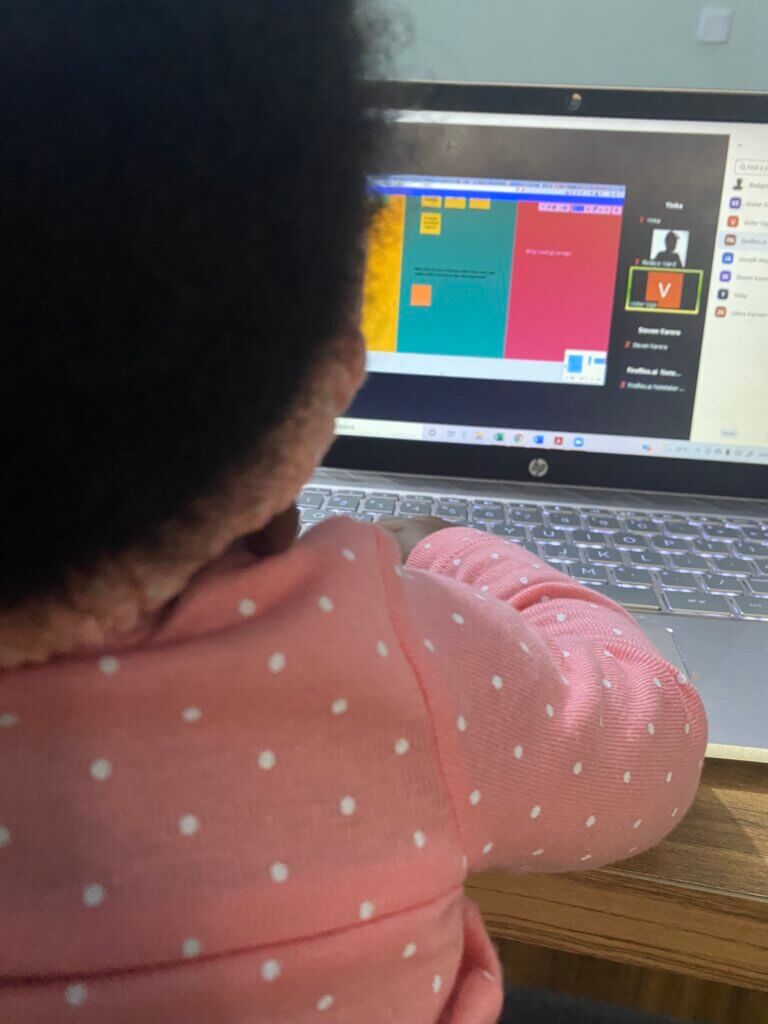When Ifedayo Ward found out she was pregnant, it wasn’t a moment of surprise or shock. “No, I wasn’t surprised at all. I actually didn’t really feel any type of way,” she says candidly. “I had been doing pregnancy tests, and they kept coming out negative, which was really stressful because I kept doing pregnancy tests. But I wasn’t surprised because I had intended on getting pregnant that month. I started trying in September, so by October, before my next period, I was supposed to be pregnant.”
As a leading creative force in her industry, Ifedayo’s work is focused on SDGs 3,5 and 16. She has a wealth of knowledge in managing small organizations gained from about a decade of working on independent projects, nonprofits and startups. So, it was definitely not a surprise when Ifedayo mentioned hers was a planned pregnancy because she is big on planning and scheduling.
Ifedayo’s persistence was also something we found interesting as she shared her experience of going to a local lab near her home almost every day. At some point, the attendant even suggested she come back after two weeks instead of testing daily. It was a planned pregnancy, not a surprise, and she embraced it with calm and intent.

Navigating Work and Pregnancy
Knowing that pregnancy might affect her work, Ifedayo made preparations. “I knew that to some extent, pregnancy would affect my work. I don’t want to call it an existing medical condition, but I knew that pregnancy was going to do something to me, and I knew it would affect my work. However, I also knew that I could effectively manage whatever was going to come because I was in a leadership role heading an organization at that time.”
From all she shared with us, her strategic approach in this period stood out, pointing to steps she put in place to avoid taking on major projects or traveling during the first few months, which as she recalled are often the hardest for many women. The first trimester, she explains, is a period when morning sickness, body weakness, and a host of other symptoms can make work difficult. “Towards the end of the first trimester, your organs start moving to make space for the growing fetus. Even for people with relatively stress-free pregnancies, you are advised not to do exerting things during the first trimester because the fetus is most feeble, and things can easily go wrong.”
When asked how her organization took the news, she shared that the response was supportive. “I had to consult the board, and they were okay with it. We looked around to see if there was a need to get someone on board who could shadow me and take on important tasks while I was on maternity leave. I also made sure that I wasn’t scheduled for any traveling for the next couple of months since my role involved a lot of it.
Ifedayo’s proactive approach made it easier for her team and herself. During her maternity leave, she still handled tasks like approving payments and attending some high-stakeholder meetings two or three months after delivery. “Those were things I wanted to do, not because I was forced to. Sometimes in leadership, you have to make concessions because you know that some things need to be done for the good of the organization. I did most of these from home since I lived next door to the office, so it wasn’t a big deal. But for tasks that could be delegated, I did delegate.”
Hola! We are garnering insights on pregnancy journeys and being a working/creative woman that can be useful for impact-driven decisions.
Take this short survey with us.
Living Next Door To The Office And Setting Boundaries
Living next door to the office was a convenience, but it also posed questions about boundaries. Ifedayo shared that she didn’t face much trouble in this regard. “It wasn’t like people were coming over to my house from work. Even when I was on maternity leave, they only came once during the naming ceremony, and maybe two people came another day with documents and to see my baby. But I put a premium on my personal space. Even though I lived next door, 90% of the people in the organization had never stepped foot in my compound.”
She emphasized the importance of setting boundaries, whether with colleagues or acquaintances, to maintain her peace and privacy.
The Emotional Rollercoaster and Health Challenges
For Ifedayo, the pregnancy experience was not so much about emotional turmoil but more about physical challenges, especially hyperemesis gravidarum—a severe form of nausea and vomiting.
“I had a lot of low moments due to hyperemesis gravidarum. It’s different from morning sickness; you’re constantly nauseous and can’t eat or even drink water. I was sensitive to artificial light and very sensitive to smells, so I spent most of my time outdoors.”
Managing this while working remotely during her first trimester was no small feat. She recounts vomiting fresh red blood from the constant strain on her throat. Even under controlled medication, it was a daily struggle. “It was tough, but I just lived through it and took it one day at a time.”
Support Systems at Work
Support from her workplace played a crucial role in her journey. “I felt really supported. It’s also about the personal relationships I had with the decision-makers. Everyone genuinely tried to ensure I wasn’t overexerting myself.” Now in a new organization, she observes how different workplaces handle pregnancy, noting that smaller organizations with tighter budgets might struggle to offer the same level of support.
Dealing with Guilt and Imperfection
Even with the support, Ifedayo admits to moments of guilt. “When I felt I wasn’t being optimal, I’d try to make up for lost time, usually at night or whenever I had the chance. But overall, I tried my best and didn’t beat myself up about it.”

Ifedayo’s story is a powerful reminder that navigating pregnancy in the workplace requires more than just personal resilience—it calls for supportive structures, understanding colleagues, and the willingness to set boundaries. For many women, speaking out about their experiences can help build a community of understanding, empathy, and support, helping others feel less alone in their journeys. So don’t keep silent, inspire others with your story!





